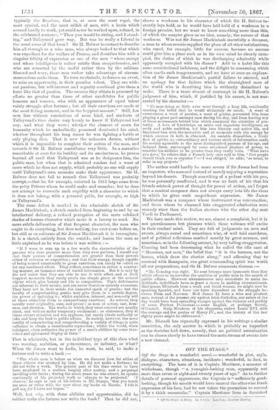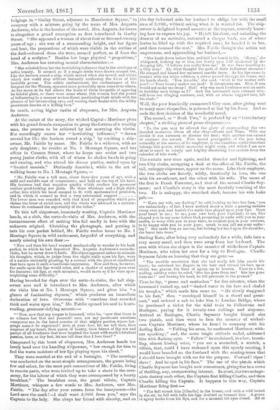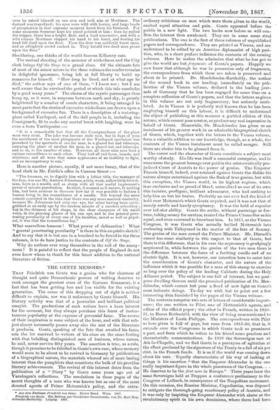OFF THE STAGE.*
Off the Stage ,is a wonderful novel — wonderful in plot, style, dialogue, characters, situations, incidents ; wonderful, iu fact, in everything. The. hero of it is Captain Mortimer, a monster of wickedness, though " a youngish-looking man, apparently not more than'seven or eight-and-twenty years of age." As to further details of personal appearance, the Captain is " sufficiently good- looking, though his mouth would have marred the otherwise frank expression of his face, had he not taken the precaution to conceal it by a thick moustache." Captain Mortimer lives- in furnished * Of the Stage: a Sforp. Is a To13. Lau-ba: Cantley Nearby.
lodgings in " G-arley Street, adjacent to Manchester Square," in company with a mistress going by the name of Mrs. Augusta Anderson, who is the heroine of the novel. Mrs. Augusta Anderson is altogether a grand conception as first introduced in Garley Street. "She appeared a woman of about four or five-and-twenty years of age ; she was of a commanding height, and her figure and bust, the proportions of which were visible in the outline of the dark-coloured dress she wore, seemed perfect, as if from the hand of a sculptor." Besides her large physical " proportions," Mrs. Anderson has towering mental characteristics:- " She exhaled from her the bewitching iufluence that is the attribute of noble beauty. It seemed as if a magic circle ware drawn around her, like the horizon round a ship, which moved when she moved, and within which few could stop without instantly confessing the force of this invisible power. The subtle enchantment, the enchantment of the Serpent for the Woman, operated more powerfully upon some than others. As the moon at its full affects the brain of those incapable of opposing its baleful glare, so there were some whom this woman had the power of influencing in a manner no loss direct, maddening their minds with the glances of hor intoxicating eyes, and crazing their brains with the wildly passionate fancies of a killing love." • So much, saving higher vaults of eloquence, for Mrs. Augusta Anderson.
At the outset of the story, the wicked Cajoled-1 Mortimer plots
with his grand female companion to grasp the fortune of a wealthy man, the process to be achieved by her marrying the victim. She accordingly exerts her " bewitching influence," " drawn around her lik the horizon round a ship," by catching a ship- owner, Mr. Fairlie by name. Mr. Fairlie is a widower, with an only daughter ; he resides at No. 1 Montagu Square, and has offices in Cannon Street, where he keeps one senior and two young junior clerks, with all of whom he shakes hands in going and coming, and who attend his dinner parties, waited upon by "liveried menials." Distiuctly describe 1, while in the act of walkiug home to No. 1 Moutegit Sauare,— " Mr. Fairlie was a tall man, about forty-five years of age with a mild and amiable cast of countenance and bald on the top of his head. His features had that negative quality which renders the possessor neither good-looking nor plain. Ho wore whiskers and a high shirt- collar, into which his head seemed to fit with mathematical precision,
and in which it seemed to find a very substantial support The lower man was rounded with that kind of proportion which pro claims the lover of social case, and the whole was adorned in a costume whose fit confessed the superiority of the tailor."
To this tall shipowner, immensely wealthy, Captain Mortimer hands, at a club, the carte-de-visite of Mrs. Anderson, with the instantaneous effect of making him fall madly in love with the
unknown original. Clutching the photograph, and putting it into his coat pocket behind, Mr. Fairlie rushee'bottle to No. 1 Montagu Square in wild excitement, forgetful of everything, and nearly missing his own door :—
" Now and then his hand seemed mechanically to wander to his back pocket, in which he had deposited Mrs. Augusta Anderson's carte-de- visite, but he never drew it forth. His object appeared rather to animate his thoughts, which, to judge from the slight smile upon his lips, wore of a nature eminently pleasing, by a contact with the piece of cardboard that bore upon it such a handsome impression. Now and then, however, the smile upon his lips would relax, and a shadow of anxiety piss over his features; his lips, at such moments, would move as if ha wore apos- trophizing some difficulty."
Having brooded for days over the carte-de-visite, the tall ship- owner sees and is introduced to Mrs. Anderson, after which she visits him at No. 1 Montagu Square, and gives hint " a glance of fascinating shyness," which produces an immediate declaration Of love. Overcome with "emotions that crowded thick and warm upon him," Mr. Fairlie opened his soul in heart- rending, grammar-defying accents:—
" Now, now that my tongue is loosened,' cries he, now that there is no witness but God and yourself ! now, ere my passionate emotions overpower me in the inner accents of that mighty passion whose lan- guage cannot be expressed! now, at your feet, let me tell thee, then empress of my heart, thou queen of beauty, thou fairest of thy sex and purest of all loveliness that ever inspired the heart with earth's loVeliost passion, here, at thy feet, let me tell thee that I love thee!' "
Conquered by this burst of eloquence, Mrs. Anderson bends her lovely head over the kneeling shipowner, " low enough for him to feel the warm moisture of her lips playing upon his cheek."
They were married at the end of a fortnight. "The marriage was conducted on the most simple arrangements, the guests being few and select, for the most part connections of Mr. Eddie, living in remote parts, who were invited up to take a share in the cere- mony, for the labour of which they were recompensed by a hearty, breakfast." The breakfast over, the great villain, Captain Mortimer, whispers a few words to Mrs. Anderson, now Mrs.
Fairlie. "The day after your return from the honeymoon—the Lord Save the mark ! —I shall want 3,0001. from you," says the Captain to the lady. She obeys her friend with alacrity, and on the day indicated asks her husband to oblige her with the stnail sum of 3,000/., without asking what it is wanted for. The ship- owner is delighted beyond measure at the reqatest, scarcely know- ing how to express his joy. " lie left his chair, and unlocking the drawer of an escritoire, extracted a cheque book, one of whose leaves he filled up with the required sum ; he handed it to her, and then resumed the seat." Mrs. Fairlie thoueht the action not ungenerous, and approaching her husband,— " She knelt down before him, and laid her hands in his. Harry,' she whispered, looking up at hint, her lovely eyes half shadowed by the
drooping lids, believe you really love me.' It Was Juno kneeling to a City man ! Ah, what thought the gods of their indiscreet absentee? He stooped and kissed her upturned marble brow. As his lips tame in contact with the white coldness, a shiver pissed through his frame, and his hands shook. You tro.uble,' she said, what is the matter with you?'—' Your beauty makes me mad! It intoxicates me. Rise, if you would not make me crazy ! God! why was Buell loveliness sent on earth to bewilder such things as I?' And the infatuated man released him- self from her clinging embrace, and, with an almost haggard face, left his chair."
Well, the poor frantically enamoured City man, after giving vent to many more yhapsodies, is poisoned at Last by his Juno. And so ends the first division of the wonderful novel.
The second, or " Book Two," is prefaced by au " introductory chapter," a striking piece of prose eloquence :—
" To the pen may bo allowed the glory of commanding the two dreaded monarchs whom all else obey—Death and Time. With one stroke it can summon or dismiss the first ; with another can extend or contract the second, This useful prerogative of the pen being naturally at the service of its employer, to the humblest scribe therefore belongs this power, which monarchs might envy, and which I am now about to exert in calmly and frigidly dismissing t we months from the calendar of this work."
The curtain now rises again, amidst thunder and lightning, and two City clerks, occupying a desk at the .olfice of Mr. Fairlie, the tall, unhappy shipowner, appear ou the scene. Like their employer, the two clerks are fiercely, wildly, frantically in love, the . one with his sweetheart, and the other with his wife. The name of the first is Frank Forrester, and that of the second Charlie Sey- mour; and Charlie's story is the most fearfully touching of the two. He is unhappy, the wretched clerk, because his wife looks pale :—
‘" Kate, my wife, my darling !' he said, looking up into hor face, you are melancholy ; of late I have noticed maitre time a passing sadness creep over you, and bauish the smile that played upon your lips. Open your heart to me ; to Ina, your own love, your husband ; to me, who clasped you in my arms before God, promising to smile with you in yottr smiles, to weep with you in your tears, to comfort you in your sorrows, to be happy with you is your joys; speak to me, tall me your suffer- ing!' She made hint no answer, but bowing her heal upon his ahouldor, she burst into tears."
Darling Kate, after being very melancholy for a while, falls into a very merry mood, and then runs away front her husband. The man with whom she elopes is the monster of wickedness Captain Mortimer, who takes her over for a trip to Boulogne. Charlie Seymour faints on learning that they are gone :- " The terrible conviction that she had really loft him smote his heart; he entwined his fingers in his hair and turned his face, upon which was graven the lines of agony, up to heaven. Then in a low. wailing, sobbing voice he cried, She has gone from me ! She has gone from me ! ' and bowing his head, ho fell prostrate to the ground." .
Thus he lay, "prone and motionless" for five minutes, when the housemai 1 rushed up, and " dashed water in his face and chafed his temples," which made him come to. " He slowly staggered to his feet," then "enveloped himself in a shawl and great- coat," and ordered a cab to take him to London Bridge, where he purchased a ticket for the tidal train to Folkestone and Boulogne, paying for it twenty-two shillings and sixpence. Arrived at Boulogne, Charlie Seymour bought himself also two pistols, and then went to face the monster of wicked- ness Captain Mortimer, whom he found in company with his darling Kate. "Folding his arms, be confronted Mortimer, with- out speaking ;" and, the mute tragic attitude ended, addressed him with flashing eyes. " Fellow !" he exclaimed, in it low, tremb- ling, almost hissing voice, " you are a scoundrel, a wreteh, a villain, that, could I have reckoned upon this speedy meeting, I would have branded on the forehead with the searing-irons that I should have brought with me for the purpose. Coward ! viper ! slave ! And he spat in his face." The use of the pistols which Charlie Seymour has bought now commences, giving rise to a scene of thrilling, nay, overpowering interest. In short, the two antago- nists destroy each other, the Captain first killing Charlie, andtheu Charlie. killing the Captain. It happens in this way, Captain Mortimer firing first :— " the ball struck him [Charlie] in the breast, and with a wild bound in the air, he fell with both his legs doubled up beneath him. A groan of agony broke from his lips, and for a moment his eyes closed. All at
once ho raised himself on one arm and took aim at Mortimer. The dastard was transfixed; his eyes wore wild with horror, and large beads of perspiration in that supreme moment burst from his forehead. For some moments Seymour kept his pistol pointed at him ; then he pulled the trigger, there was a bright flash and a loud concussion, and with a wild scream Mortimer clapped his hand to his heart, and bowing his head fell dead upon the floor. Then the door was suddenly burst open, and an affrighted crowd rushed in. They beheld two dead men prone upon the floor."
Shuddering, one thinks of the world-famous Kilkenny cats.
The mutual shooting of the monster of wickedness and the City clerk brings Off the Stage to a grand close. Of the ultimate fate of most of the minor actors in the three volumes the reader remains in delightful ignorance, being left at full liberty to build up romances for himself. "How long he lived, and at what age he died," the author says of one of them, " I know not ; but I am well aware that he survived the period at which this tale concludes by a good many years." The charm of the mystic personages thus hung up, as it were, in suspense between earth and sky, is greatly heightened by a number of comic characters, it being arranged in most parts that the stories of excessive wickedness are drawn upon a background of excessive fun. There is a description of a watering- place called Yartlepool, and of the dull people in it, including the Coastguards, fit to make any mortal burst with laughing, were he even a born Yartlepooler :- "It is a remarkable fact that all the Coastguardmen of the place were very stout. The joke was become stale now, but in days of yore the merriment of the most phlegmatic of the Yartlepool spectators was provoked by the spectacle of one fat man, in a glazed hat and telescope, usurping the place of another fat man, in a glazed hat and telescope, and so on, to the number of nine. Moreover, all these nine men bore a curious resemblance to each other. They had all red faces, beards, and whiskers ; and all wore that same appearance of an inability to light, and an incompetency to run."
Here is another picture, equally, if not more funny, that of the head clerk in Mr- Fairlie's office in Cannon Street :—
" The foreman, or, to dignify him with a loftier title, the manager of the firm, was one Mr. Andrew Johnstone, a thin, weak, sallow little Scotch- man, keen as a needle, and as sharp, with all that useful implement's power of minute penetration. In short, it seemed as if nature, in making him, had been anxious to discover how far it was possible to fashion a human being in the resemblance of a needle. Not beyond the mere conceit convoyed in the idea that there was any more marked similarity, because Mr. Johnstone had only one eye, the other having been extin- guished at an early age by the random missile of a careless schoolboy ; but in the thinness of his shape, in the clear sharpness of his small voice, in the piercing glance of his one oye, and in the general pene- trating peculiarity of every one of his faculties, moral as well as physi- cal, it was that the resemblance lay."
What marvellous humour ! What power of delineation ! 'What " general penetrating peculiarity " is there in this exquisite sketch ! And to say that it is but one in a hundred to be found in the three volumes, is to do bare justice to the contents of Off the Stage.
Why do authors ever wrap themselves in the veil of the anony- mous? It is painful to reflect that the people of England do not even know whom to thank for this latest addition to the national literature of fiction.




































 Previous page
Previous page